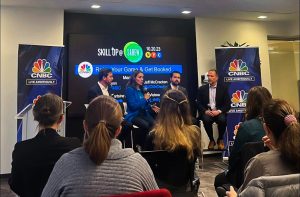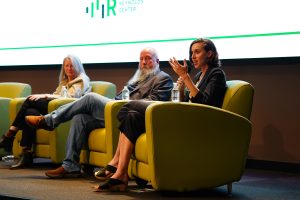J.M. Henderson is a freelance journalist and researcher who has been covering Millennials since they were still being called “Generation Y.” Her writing focuses on the intersection of economics, demographics, labor market trends and popular culture. In addition to her ongoing affiliation with “The Ground Floor” at Forbes, her work has appeared in Salon, The Atlantic, The Globe and Mail and Pacific Standard.
Young journalists might look to you as a source of inspiration for their own career paths. How did you get to where you are today?
I started blogging back in 2009 about Millennial issues, even though we weren’t using that term then. I was able to leverage that blog into other freelance opportunities, one of which was a startup out of New York that was eventually acquired by Forbes. At that point, I had the opportunity to pitch to an editor who had gone over to Forbes, and in 2011 I started a freelance contract with them. That experience really opened a lot of doors with other publications.
Do you have any tips for writers who are trying to become freelancers?
If you are lucky enough to have one, do not quit your day job! Especially when you’re just starting out. It takes a long time—if it happens at all—to be financially stable strictly from freelancing. Often when you see people who look to be successful freelancers, dig a little deeper into their stories. There are a lot of instances where it’s somebody who came from money or it’s somebody who has a partner with a stable job and they’re able to freelance and not have to worry about the rent due next month. And if you’re lucky enough to be doing something nine-to-five now, use that as the stable base from which you can build a freelance portfolio. Create your tolerance for the freelance lifestyle from that stable place, then build on that, and continue to leverage those opportunities that come your way.
Are there any lessons that are important for writers just starting out?
One of the most important lessons is the power of connections. It’s great if you’re doing good work. However, what people don’t see is how a lot of writers get to a strong freelance career, and it’s about making and maintaining connections. So if you connect to an editor at one publication and then he or she moves to another, there’s another publication where you know somebody who’s open to working with you. There are only so many publications in the world, and people tend to move among them pretty frequently in this business. If you’re able to cultivate those connections and relationships, it certainly broadens your ability to get a foot in the door. Focus on those relationships and understand they are incredibly valuable.
The other big lesson for me is the balance between sharing and promoting your work, but making sure that you’re not giving it away. That you’re not putting ideas out there and then allowing somebody else, be it an editor or another writer, to come along and take those. Be cautious about how much of your work you put out before somebody has agreed to pay you.
In an era where the public’s trust of the media is at record lows, how do you ensure that your writing connects with people?
I try to be really meticulous sourcing the facts that I’m relying on to make my argument. I don’t make any broad, sweeping statements that I’m not backing up with a credible source. And then it’s up to people if they want to click on those links, or look at those footnotes to check my facts. It shows that I’ve done the legwork to fact-check and put in the sources. So readers can see the digital paper trail of where that information is coming from. I think that’s really important.
Can you walk me through a typical day for you?
A typical morning for me is a blend of working on things like what my next Forbes piece will be, and then searching for new ideas. I’ll scan Twitter and see if there’s something that jumps out. I’ll read other media to see what people are covering and reporting on. I’ll spend some time gathering information and putting a few ideas into a Google doc. I also probably have a draft of a piece that I’m currently working on that I’ll take some time refining and giving a last once-over before it goes up. Ideally, I like to let things sit for a good 24 hours after I’ve finished writing them, and then go back and see what I can tweak or where I might make some changes. In the afternoon, I’ll probably do some other types of freelance work that are more lucrative. I’ll also spend some time on client work.
Then, if possible, I like to take the evenings off entirely. I’ve learned that it’s really easy for me to still be tapping away at nine or ten at night, and I don’t think it’s good for me as a person or for my work and my process. So I try to reserve the evening for things like doing watercolors, or reading a book, or even watching professional wrestling! Anything that’s not work related. I’m trying to get better at enforcing those boundaries. Daylight hours are for working on what I’ve got in the pipeline and info-gathering for what’s on the horizon. But then evenings I devote to things that are able to help me recharge and get up and do the same thing the next day.










